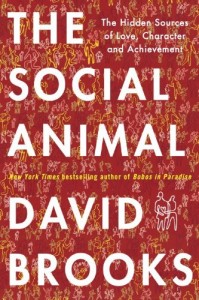Book Review
 David Brooks’s The Social Animal is not a novel, though if it were released as one by a small press it would be spared the indignity of being released under the near-pejorative banner of “pop sociology.” Protagonists Harold and Erica live forever in the present, born in 2011 to Bobo parents; slacking through college in 2011 as inveterate Call of Duty players; dying in 2011 as remarkably accomplished, super-active boomer seniors. They live on the page in conversation with a torrent of contextualized research on such topics as neuroscience and cognitive and social psychology; the book is comfortable offering, in close contact, a narrative of Harold’s high school fascination with the Greek mind and a summary of new developments in the fields of learning methods and human knowledge.
David Brooks’s The Social Animal is not a novel, though if it were released as one by a small press it would be spared the indignity of being released under the near-pejorative banner of “pop sociology.” Protagonists Harold and Erica live forever in the present, born in 2011 to Bobo parents; slacking through college in 2011 as inveterate Call of Duty players; dying in 2011 as remarkably accomplished, super-active boomer seniors. They live on the page in conversation with a torrent of contextualized research on such topics as neuroscience and cognitive and social psychology; the book is comfortable offering, in close contact, a narrative of Harold’s high school fascination with the Greek mind and a summary of new developments in the fields of learning methods and human knowledge.
Brooks’s project here is distinguished from his work on the New York Times’ editorial page and his mildly satirical previous books, such as Bobos in Paradise, by his aims. He’s not content observing the lives and foibles of his “Bourgeois Bohemians” any longer; in The Social Animal he trades “they” for “we,” suggesting not only a broad unifying theory of why people behave as they do but also a moral basis for understanding it.
The unconscious is impulsive, emotional, sensitive, and unpredictable. It has its shortcomings. It needs supervision. But it can be brilliant. It’s capable of processing blizzards of data and making daring creative leaps. Most of all, it is also wonderfully gregarious. Your unconscious, that inner extrovert, wants you to reach outward and connect . . . Your unconscious wants to entangle you in the thick web of relations that are the essence of human flourishing. It longs and pushes for love . . . Of all the blessings that come with being alive, it is the most awesome gift.
At one point in The Social Animal, Brooks quotes a professor—one of many—who suggests that “one of the most enduring lessons of social psychology is that behavior change often precedes change in attitude and feelings.” At its best the book seeks to work the same way—his fictional stars, living people molded out of his extensive research materials, enact the lessons of his findings on the unconscious mind before they consciously understand them.
For Brooks, Harold and Erica are not just characters in a fiction but exemplars of the preeminent unconscious life. There’s a strange, appealing postmodern humanism that echoes throughout, culminating in the moment when, after a lifetime of 2011s, Harold finally “[sees] life as a neverending interpenetration of souls.” Brooks sees life as an endlessly complex social dance—one led, through every step, by a conception of Freud’s unconscious mind as a sort of closet romantic, writing generous checks the conscious mind is left to imagine why it cashed. At one point Brooks drops the following epiphany through the authorial trap-door into the hands of Erica:
Society isn’t defined by classes, as the Marxists believe. It’s not defined by racial identity. And it’s not a collection of rugged individualists, as some economic and social libertarians believe. Instead, Erica concluded, society is a layering of networks.
Most of the networks here are unconscious, dictated by care and maintenance of one’s emotions and “noncognitive skills,” and Harold and Erica—who live, Brooks promises in the opening line, “the happiest story you’ve ever read”—are the benefactors of this new perspective. They find their completely unironic happiness by understanding a desire for connectedness their conscious minds can’t quite fathom.
It’s a work of remarkable and unexpected ambition, and its success is based in large part on Brooks’s limitations and preoccupations. He’s not an academic, a novelist, a neuroscientist, or a theoretician, and he comes at the importance of relationships and social networks without a culture-studies professor’s rancor or a novelist’s desire for narrative. So the narrative is, at times, brutally thin, the outrage is insufficiently outraged, and the science is shallow and broad. His pattery stand-up on upper-middle-class follies feels recycled, at its worst, from Bobos.
But this is a book about human empathy written with empathy, and a book about happiness that believes in the prospect of happiness. To fulfill his lofty promise to point “to a deeper way of flourishing and a different definition of success” informed by the last thirty years of cognitive research, Brooks musters up just enough novelistic range and sociological understanding to paint a messy picture of a messy social universe without finding himself beholden to the expectations of either tradition. For a book about humanity’s ceaseless, unfulfilled drive to describe itself from all angles, Brooks’s earnest multidisciplinary dabbling is, finally, only fitting.
About the Reviewer
Dan Moore is a graduate student at Colorado State University. His book reviews have previously appeared online and in the Wall Street Journal.